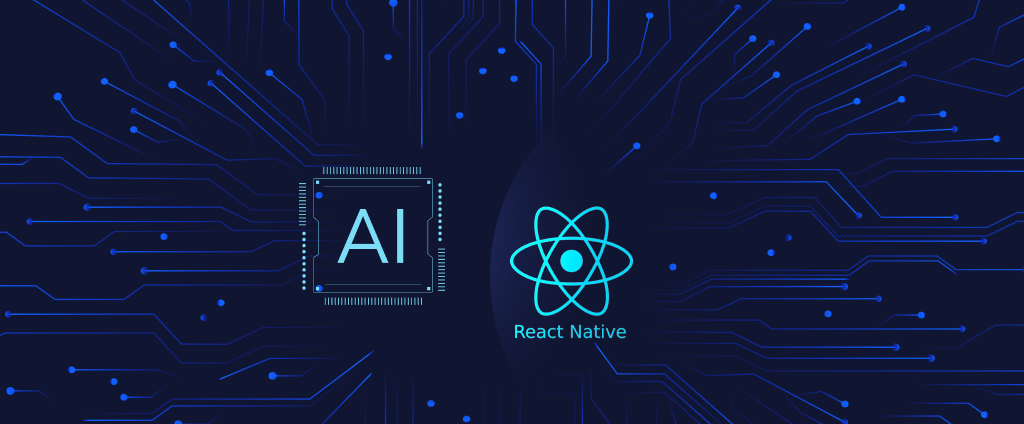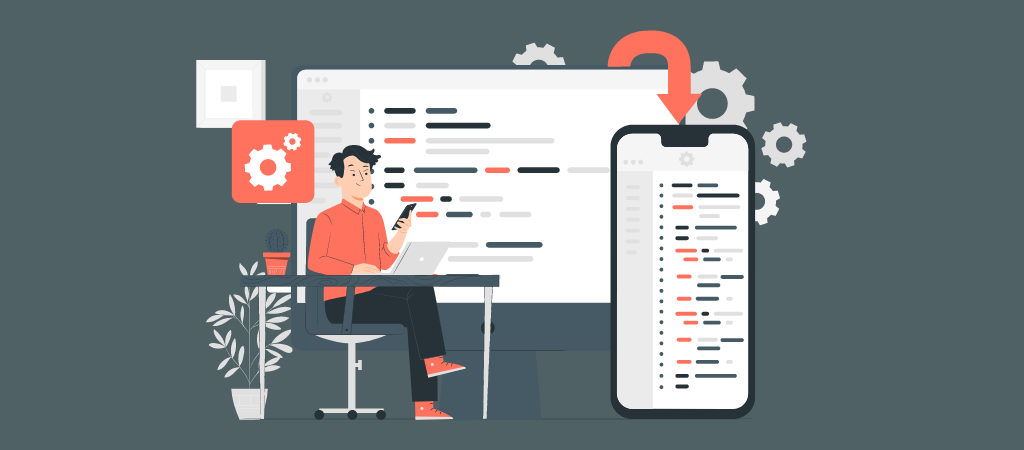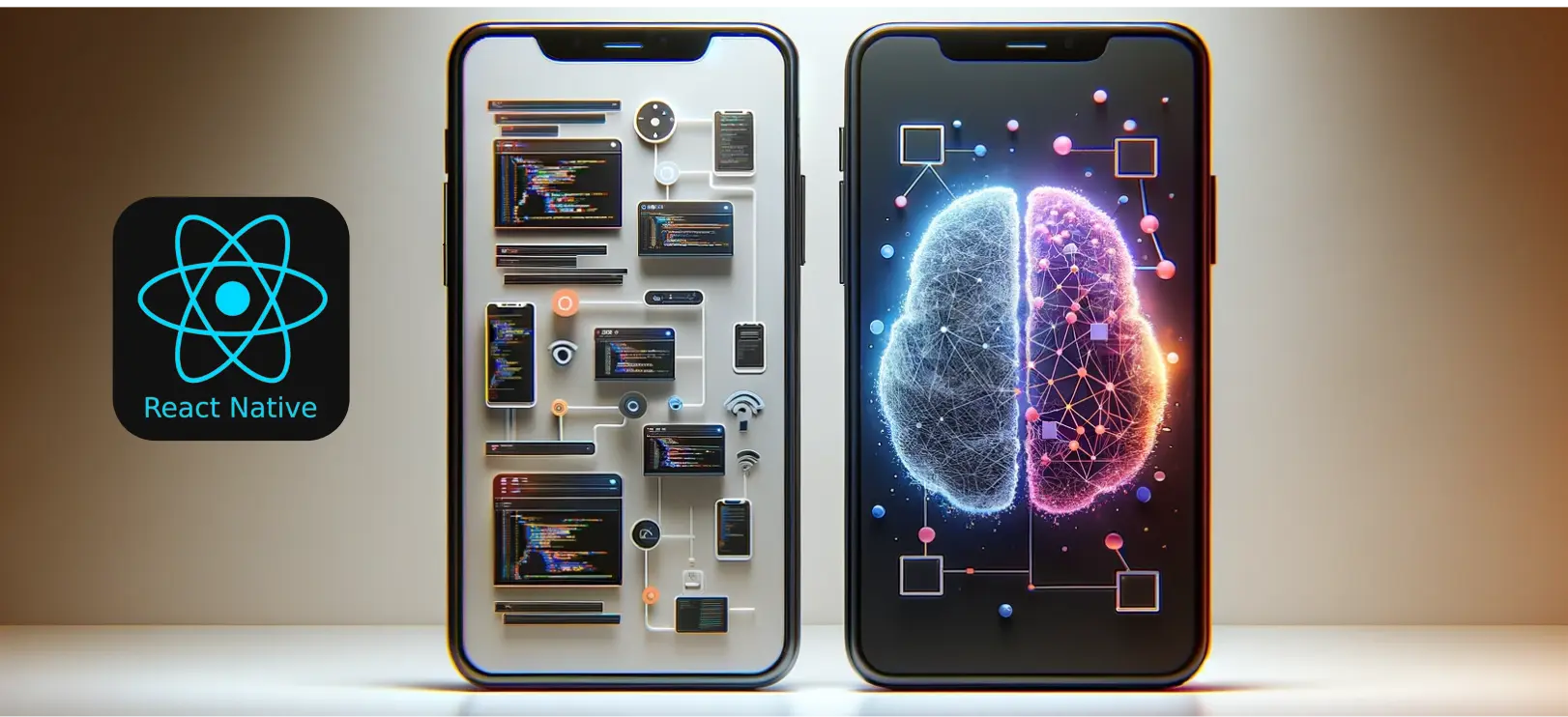React Native, a product of Facebook’s innovation has transformed mobile app development by enabling the creation of native applications for iOS and Android platforms using a singular JavaScript codebase. This article explores the integration of AI with React Native, highlighting how it brings unparalleled personalization, efficiency, and innovation to mobile apps.
The advent of Artificial Intelligence (AI) in React Native mobile app development marks a significant evolution, leading the way in custom Android app development and hybrid mobile app development.
Understanding React Native for Mobile App Development

React Native significantly impacts cross-platform development efficiency by simplifying coding and ensuring the end product feels genuinely native. React Native is a favorite, as illustrated by the wealth of resources and developer support available. Let’s explore its functionalities:
Cross-Platform Development Efficiency
Developers can write a single codebase for both iOS and Android platforms. This efficiency drastically reduces development time and resources, making React Native a favorite among those looking to optimize development workflows without sacrificing quality. For instance, we leveraged React native as a core technology to develop a mobile app for wine lovers.
Native App Experience
Unlike other frameworks that compromise on performance for the sake of cross-platform compatibility, React Native ensures that the end-user experience is as good as native apps. This is achieved through the use of native components, ensuring that the look, feel, and performance of apps remain top-notch.
Community Support and Ecosystem
With extensive community support, developers can access a wealth of libraries, tools, and resources. This ecosystem empowers developers to solve complex problems more efficiently and to innovate within their app projects. Furthermore, we empowered the football community with custom hybrid mobile app development for coaches & players.
Development Flexibility and Productivity
Features like hot reloading improve developer productivity by allowing for real-time feedback on changes, significantly speeding up the development process.
The Emergence of AI in Mobile App Development

AI has revolutionized mobile app development, offering predictive user behavior analysis and automated development processes. These advancements enrich the user experience by introducing advanced functionalities like chatbots, voice recognition, and augmented reality. The transition from an e-commerce website to a mobile app is a prime example of how AI can automate and refine development processes. Following are some more examples:
Predictive User Behavior Analysis
By leveraging AI, apps can predict user actions and preferences, offering personalized experiences that significantly boost engagement and user retention.
Automated and Efficient Development Processes
From automating code generation to optimizing app performance through predictive analytics, AI enhances the efficiency of the development process, reducing time to market for new features and applications.
Introduction of Advanced Functionalities
AI facilitates the integration of advanced functionalities like chatbots for improved customer service, voice recognition for hands-free operations, and augmented reality experiences, setting a new standard for what mobile apps can achieve.
Enhanced User Engagement
AI-driven personalization enhances user engagement by providing content and recommendations tailored to individual preferences.
Innovation & Cost Efficiency
Automating development tasks reduces the need for manual effort, thereby cutting development costs. AI opens up new possibilities for app functionalities, including voice recognition and predictive analytics, setting a new benchmark for mobile apps. You can collaborate with iOS-certified developers to empower the iOS App Store community.
AI’s Integration in React Native Mobile App Development

The integration of AI with React Native allows for personalized user experiences and intelligent performance optimization. For example, AI-driven chatbots in customer service can significantly enhance user interaction and satisfaction.
- Customized User Experiences: AI algorithms tailor experiences to individual users, from personalized content recommendations to adaptive user interfaces that change based on user behavior.
- Intelligent Performance Optimization: AI-driven tools analyze app performance in real-time, identifying and addressing issues before they impact users. This preemptive optimization ensures smooth, responsive apps across all devices.
- Automated Testing and Quality Assurance: Leveraging AI for testing enables more thorough and efficient identification of bugs and performance issues, streamlining the quality assurance process and ensuring a higher quality final product.
Best Practices for AI-based Hybrid Mobile App Development

Integrating AI into mobile app development requires a thoughtful approach to ensure that the technology not only enhances the user experience but also aligns with business goals and ethical standards. Here are several best practices to consider when developing AI-based applications with React Native:
Start with a Clear Objective
- Define Clear Use Cases: Begin by identifying specific problems or areas where AI can add value. Whether it’s improving user engagement, personalizing content, or automating tasks, having a clear objective guides the development process.
Focus on User Privacy and Data Security
- Implement Robust Data Handling Protocols: With AI-driven apps collecting and analyzing vast amounts of user data, it’s crucial to adhere to strict data privacy laws and ethical guidelines. Ensure that your app has transparent data usage policies and secure data storage and transmission mechanisms.
Optimize AI Model Performance
- Use Efficient Algorithms: Select AI algorithms that are optimized for mobile devices. Consider the computational resources required and aim for models that deliver high performance without draining battery life or requiring excessive processing power.
- Iterative Testing and Improvement: AI models can always be improved. Regularly test the app’s AI features against real-world scenarios and user feedback to refine and enhance model accuracy and performance.
Enhance User Experience with AI
- Seamless Integration: AI features should feel like a natural part of the app, enhancing the user experience rather than complicating it. Whether it’s through personalized recommendations or intelligent assistants, ensure that AI elements are intuitive and add tangible value.
Leverage Community Resources and Tools
- Stay Updated and Collaborate: The AI and React Native communities are vibrant and resourceful. Participate in forums, attend webinars, and collaborate on open-source projects to stay at the forefront of AI advancements. Utilize libraries and tools that facilitate AI integration into React Native apps, streamlining the development process.
Consider the Impact of AI
- Ethical AI Use: Always consider the ethical implications of AI in your applications. From bias in AI models to the potential impact on employment, it’s important to develop AI solutions that are responsible and beneficial for all users.
- Sustainability: As AI models become more complex, their environmental impact can grow due to increased computational demands. Opt for efficient models and cloud-based solutions that minimize carbon footprints.
Continuous Learning and Adaptation
- Embrace AI Evolution: AI technology is rapidly evolving. Stay informed about the latest trends, techniques, and tools in AI to continually enhance your app’s features and performance.
Challenges and Considerations in Integrating AI into React Native

Despite its benefits, integrating AI into React Native mobile apps presents challenges:
- Complexity: The implementation of AI technologies demands a solid understanding of machine learning and data analytics. You can hire Android developers experts in AI & ML for custom solutions.
- Data Privacy and Security: With AI-driven apps collecting vast amounts of user data, ensuring privacy and security becomes crucial.
- Resource Intensiveness: Developing and training AI models requires significant computational resources.
Examples of AI-Integrated React Native Apps
To illustrate the impact of AI on React Native mobile app development, let’s look at a few examples where AI has been successfully integrated to enhance app performance and user experience:
Personal Finance Assistants
Apps that utilize AI to analyze users’ spending habits, offer personalized savings advice and predict future expenses. These apps can provide users with a detailed analysis of their financial health and offer recommendations on how to improve it.
Health and Fitness Trackers
AI-driven React Native apps in the health sector can monitor user activities, suggest workouts, and even predict potential health issues based on user activity and health data as shown in our health and fitness app project.
Language Learning Tools
By integrating AI, language learning apps can offer personalized lessons that adapt to the user’s learning pace, strengths, and weaknesses. These apps can analyze user responses to tailor future exercises, making language learning more effective and engaging.
Customer Service Chatbots
AI-powered chatbots can handle customer inquiries 24/7, providing instant responses to common questions and improving overall customer satisfaction. These chatbots can learn from past interactions to improve their response accuracy over time.
E-commerce Recommendations
AI algorithms in e-commerce apps analyze user browsing and purchase history to offer personalized product recommendations. This not only enhances the shopping experience but also increases the likelihood of purchases.
The Future of AI in React Native Mobile App Development
As we look toward the future, several trends and advancements are set to shape the integration of AI in React Native development:
- Evolving AI Technologies: Continued advancements in AI will introduce more sophisticated and efficient algorithms, enhancing app personalization, and making AI integration more accessible to developers.
- Improved User Interfaces: Future AI developments will focus on creating more intuitive and adaptive user interfaces, capable of understanding user intentions and providing assistance even before the user asks.
- Sustainability and Ethics in AI: As awareness around the ethical use of AI and data privacy grows, future integration efforts will place a stronger emphasis on sustainable AI practices and ethical considerations, ensuring that apps not only become smarter but also respect user privacy and data integrity.
What is the Cost to Implement AI into React Native?
Incorporating AI into React Native apps directly influences the financial aspects of app development, including:
- Upfront Investment vs. Long-term Value: While the initial costs associated with integrating AI may be higher due to the need for specialized talent and computational resources, the long-term benefits—such as increased user engagement, loyalty, and operational efficiencies—often outweigh these initial investments.
- Resource Allocation for AI Development: Developers must consider the allocation of resources, not just in terms of finances but also in computational power and data storage, to effectively support AI functionalities.
- Cost-Efficiency Through Automation: AI’s potential to automate parts of the development and maintenance process can lead to significant cost savings over time, reducing the need for manual intervention and speeding up the development lifecycle.
Frequently Asked Questions
Absolutely. Its ability to enable cross-platform development while ensuring a native user experience makes it an excellent choice.
AI enhances app personalization, automates development tasks, and introduces innovative features, improving both the development process and the user experience.
Yes, by automating tasks and making the development process more efficient, AI can significantly reduce both time and costs.
The main challenges include the complexity of AI technologies, ensuring data privacy and security, and the resource intensiveness of AI models.
Start by understanding the basics of AI and machine learning, then explore libraries and tools that facilitate AI integration into React Native apps.
Conclusion
The integration of AI in React Native mobile app development represents a significant leap forward, blurring the lines between technology and human-like intelligence. As developers and businesses continue to explore and invest in AI technologies. It is the best time to collaborate with a mobile app development company to develop custom solutions by utilizing AI and React Native technologies.
The future of mobile app development is bright, and AI is undoubtedly at its core, driving innovation and transforming the user experience in ways we are only beginning to imagine
Stay Tuned for Latest Updates
Fill out the form to subscribe to our newsletter





